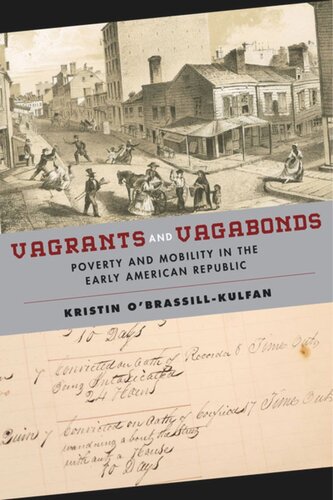

Most ebook files are in PDF format, so you can easily read them using various software such as Foxit Reader or directly on the Google Chrome browser.
Some ebook files are released by publishers in other formats such as .awz, .mobi, .epub, .fb2, etc. You may need to install specific software to read these formats on mobile/PC, such as Calibre.
Please read the tutorial at this link: https://ebookbell.com/faq
We offer FREE conversion to the popular formats you request; however, this may take some time. Therefore, right after payment, please email us, and we will try to provide the service as quickly as possible.
For some exceptional file formats or broken links (if any), please refrain from opening any disputes. Instead, email us first, and we will try to assist within a maximum of 6 hours.
EbookBell Team

5.0
80 reviewsThe riveting story of control over the mobility of poor migrants, and how their movements shaped current perceptions of class and status in the United States
Vagrants. Vagabonds. Hoboes. Identified by myriad names, the homeless and geographically mobile have been with us since the earliest periods of recorded history. In the early days of the United States, these poor migrants – consisting of everyone from work-seekers to runaway slaves – populated the roads and streets of major cities and towns. These individuals were a part of a social class whose geographical movements broke settlement laws, penal codes, and welfare policies. This book documents their travels and experiences across the Atlantic world, excavating their life stories from the records of criminal justice systems and relief organizations.
Vagrants and Vagabonds examines the subsistence activities of the mobile poor, from migration to wage labor to petty theft, and how local and state municipal authorities criminalized these activities, prompting extensive punishment. Kristin O’Brassill-Kulfan examines the intertwined legal constructions, experiences, and responses to these so-called “vagrants,” arguing that we can glean important insights about poverty and class in this period by paying careful attention to mobility. This book charts why and how the itinerant poor were subject to imprisonment and forced migration, and considers the relationship between race and the right to movement and residence in the antebellum US. Ultimately, Vagrants and Vagabonds argues that poor migrants, the laws designed to curtail their movements, and the people charged with managing them, were central to shaping everything from the role of the state to contemporary conceptions of community to class and labor status, the spread of disease, and punishment in the early American republic.